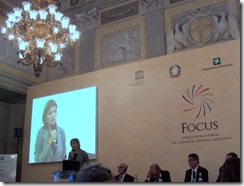 The first UNESCO World Forum on Culture and Cultural Industries occurred at Monza, near Milan, 24-26 September. It brought together around 200 participants from areas of fashion, business, politics, design and craft. There were a broad diversity of nationalities, with strong representations from Italy, France, Uruguay, South Africa. As the only representative from the Pacific region, I felt a little isolated initially, but soon found strong connections particularly from other countries of the south.
The first UNESCO World Forum on Culture and Cultural Industries occurred at Monza, near Milan, 24-26 September. It brought together around 200 participants from areas of fashion, business, politics, design and craft. There were a broad diversity of nationalities, with strong representations from Italy, France, Uruguay, South Africa. As the only representative from the Pacific region, I felt a little isolated initially, but soon found strong connections particularly from other countries of the south.
The event was well-organised, strategic, relevant and in particular, provocative.
The premise of this Monza gathering was that cultural heritage can benefit from an association with business, and vice versa. According to the brief:
Cultural industries, notably in the areas of design and fashion, embody a continuum between traditional inspiration, the fruit of identity, and modernity. They would benefit from being more deeply rooted in traditional know-how. Cultural industries must be able to give life to and be nourished by know-how through adapting to a changing world. In so doing, they can embody a constant dynamic of renewal.
This move towards the private sector a shift from the focus that many associate with UNECSO, which would be to work with state institutions such as museums and universities to sustain traditions. Previously, the operations of the capitalist market would have been seen as a threat to cultural heritage. Not so today. This link between culture and business has become a familiar conversation in Australia, so how does it sound on the global stage?
Given the support of its hosts, it is understandable that the Italian perspective was strongly featured in the forum. The Italians have much to gain by associating their products with their cultural heritage. This gives them an obvious edge over countries like China, particularly in luxury brands.
It was surprising to see how strongly craft figured in this. In the opening session, Sandro Bondi the Italian Minister for Cultural Heritage and Activities spoke of the close link between the handmade and an aesthetic sensibility. Roberto Formigoni, the President of the Lombardy Region, saw craftsmanship as the essential basis for successful industrialisation.
 Complementing this were some high-powered presentations from business consultants about ways of marketing craft. Tom Pigott, the CEO of BrandAid, spoke about their pilot project in Haiti, where they recruited Hollywood celebrities to support local metalsmiths. He made the emphatic point that ‘Poverty needs marketing’.
Complementing this were some high-powered presentations from business consultants about ways of marketing craft. Tom Pigott, the CEO of BrandAid, spoke about their pilot project in Haiti, where they recruited Hollywood celebrities to support local metalsmiths. He made the emphatic point that ‘Poverty needs marketing’.
This was one point that warranted critical reflection. It’s a curious statement, when you break it down to its components. The implied aim is to improve the standard of living for artisans, so their craft can flourish. One way to do this is to sell their very impoverishment as something attractive, particularly to consumers whose only real lack is lack itself. Yet, the success of this will inevitably destroy the very quality on which its success depends – poverty. Hopefully, future forums will be able to work through this contradiction.
At the very theatrical conclusion of the forum, the Minister for Foreign Affairs Franco Frattini joined his Italian colleagues in offering the sumptuous building of Villa Real as the permanent site for the UNESCO forum, which would become an annual event.
The UNESCO World Forum on Culture and Cultural Industries faces the challenge of finding a place for itself amongst a number of similar global platforms, such as the recent World Summit on Arts and Culture in Johannesburg.
The forum touches a sensitive nerve in the status of world crafts. It resonates with the current consensus that heritage is a living process that must be able to respond to modernity. The support of rich consumers is a real alternative. I think there’s an argument for the benefits of such patronage in supporting excellence and diversity in crafts, especially in the land of the Medicis. But there are also real issues in the breadth and sustainability of those benefits.
So might this debate proceed? In my next post I’ll mention what to me were some of the productive threads of discussion that emerged at Monza.
The highlight of the forum was the emphasis on the power of the entrepreneur to really make a difference in a world in recovery mode. I think this “permission” given to the private sector is an amazing opportunity and should be embraced with entrepreneurial energy and wisdom. Great forum and as Madame Riviere Mentioned in the closing remarks, this is just the beginning of the conversation!